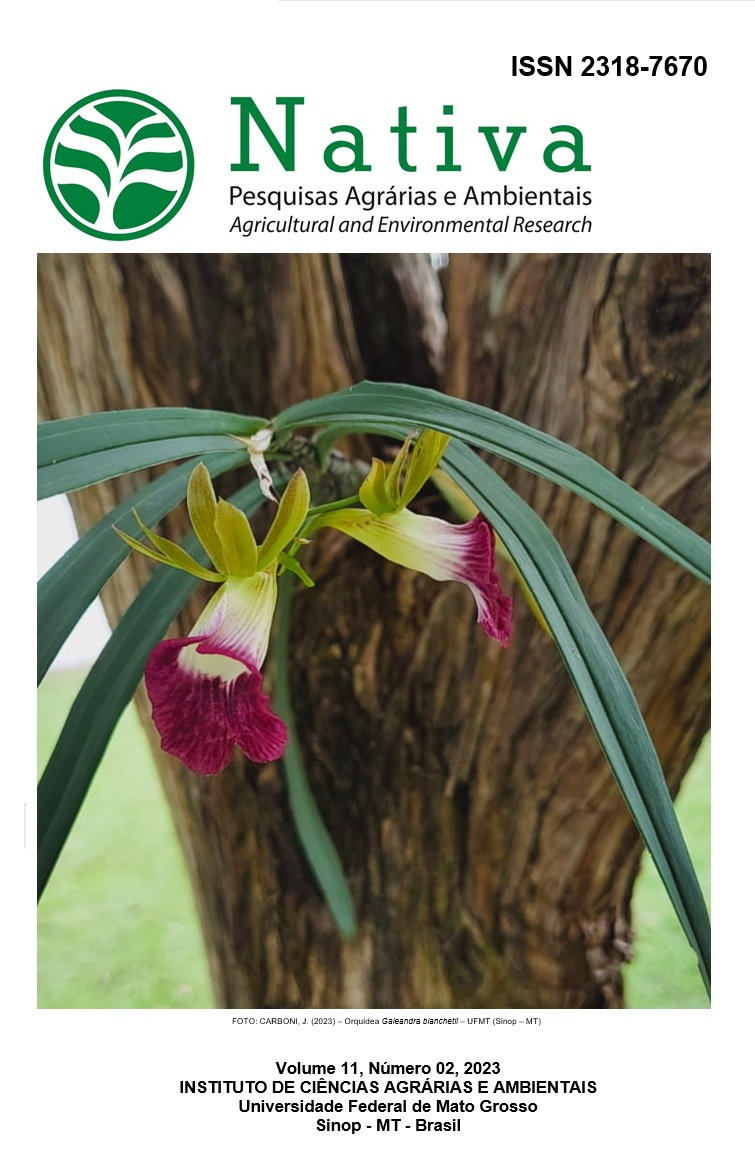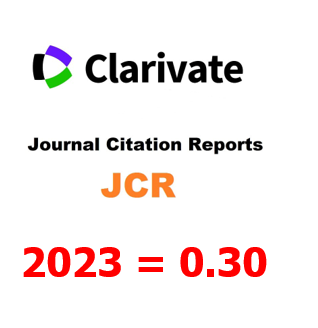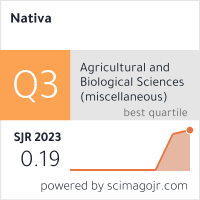REGENERAÇÃO NATURAL DE ESPÉCIES COMERCIAIS EM ÁREA SUBMETIDA AO MANEJO FLORESTAL EM PEQUENA ESCALA NO MÉDIO AMAZONAS
DOI:
https://doi.org/10.31413/nat.v11i2.14986Palavras-chave:
área de clareira, disponibilidade de luz, espécies pioneirasResumo
A investigação da regeneração natural após manejo florestal em pequena escala é crucial para a compreensão dos impactos que a exploração florestal causa na estrutura e dinâmica da floresta. Neste estudo, foi avaliada a regeneração natural de espécies comerciais exploradas em manejo florestal em pequena escala. Para isso, vinte clareiras de exploração foram caracterizadas de acordo com o tamanho, abertura de dossel e altura da floresta de borda. Em seguida, a regeneração natural foi diagnosticada a partir da identificação de espécies comerciais (altura ≥ 1,3 m) em nove parcelas de 2 x 2 m. A associação entre a abundância e riqueza da regeneração natural foi testada com correlação de Pearson. Foram encontrados 205 indivíduos, pertencentes a 42 espécies e 11 famílias. As espécies que comumente se repetiram foram Protium apiculatum, Protium decandrum e Goupia glabra. A abertura de dossel esteve positivamente associada com a abundância e riqueza de espécies, mas não com a composição de espécies. Portanto, existe uma abundante e diversificada regeneração de espécies comerciais nas clareiras e; a disponibilidade de luz afeta positivamente a quantidade de mudas e espécies da regeneração. No entanto, a composição de espécies nas clareiras não depende da disponibilidade de luz e deve ser manipulada via plantio de enriquecimento.
Palavras-chave: área de clareira; disponibilidade de luz; espécies pioneiras.
Natural regeneration of commercial species in area submitted to small-scale forest management in the middle Amazon
ABSTRACT: The investigation of natural regeneration after small-scale forest management is crucial for understanding the impacts that logging causes on the structure and dynamics of the forest. This study evaluated the natural regeneration of commercial species exploited in small-scale forest management. For this, twenty logging gaps were characterized according to size, canopy opening and forest edge height. Then, natural regeneration was diagnosed from the identification of commercial species (height ≥ 1.3 m) in nine 2 x 2 m plots. The association between the abundance and richness of natural regeneration was tested with Pearson's correlation. A total of 205 individuals were found, belonging to 42 species and 11 families. The species that commonly repeated were Protium apiculatum, Protium decandrum and Goupia glabra. Canopy openness was positively associated with species abundance and richness, but not with species composition. Therefore, there is an abundant and diversified regeneration of commercial species in the gaps and the availability of light positively affects the number of seedlings and species in regeneration. However, species composition in gaps does not depend on light availability and must be manipulated via enrichment planting.
Keywords: gap area; light availability; pioneer species.
Referências
BAZZAZ, F. A.; PICKETT, S. T. A. Physiological ecology of tropical succession: a comparative review. Annual review of ecology and systematics, v. 11, p. 287-310, 1980. 10.1146/annurev.es.11.110180.001443
CONSELHO ESTADUAL DO MEIO AMBIENTE (AMAZONAS) – CEMAAM. Resolução Cemaam Nº 007, de 21 de junho de 2011. (D.O.E 22 jun. 2011).
CONSELHO ESTADUAL DO MEIO AMBIENTE (AMAZONAS) – CEMAAM. Resolução Cemaam Nº 017, de 20 de agosto de 2013. (D.O.E 05 fev. 2014).
COSTA, D. H. M.; SILVA, J. N. M.; DE CARVALHO, J. O. P. Crescimento de árvores em uma área de terra firme na floresta nacional do tapajós após a colheita de madeira. Revista de Ciências Agrárias Amazonian Journal of Agricultural and Environmental Sciences, v. 50, n. 1, p. 63-76, 2008.
D’OLIVEIRA, M. D.; DE ARAÚJO, H. J. B.; CORREIA, M. F.; da SILVA, M. P. Manejo florestal sustentável na pequena propriedade. Rio Branco: Embrapa Acre, 2007. 32p. (Documentos, 106)
D’OLIVEIRA, M. V. N. Regeneração florestal em clareiras artificiais após dois anos de abertura de dossel no Estado do Acre. In: GONÇALVEZ, R. C.; DE OLIVEIRA, L. C. (Eds.) Embrapa Acre: Ciência e Tecnologia Para o Desenvolvimento Sustentável do Sudoeste da Amazônia. Rio Branco: Embrapa Acre, 2009. P. 68-96. Disponível em: https://ainfo.cnptia.embrapa.br/digital/bitstream/item/173007/1/22900.pdf
D’OLIVEIRA, M. V.; RIBAS, L. A. Forest regeneration in artificial gaps twelve years after canopy opening in Acre State Western Amazon. Forest Ecology and Management, v. 261, n. 11, p. 1722-1731, 2011. https://doi.org/10.1016/j.foreco.2011.01.020
DALY, D. C. de B.; FINE, P. V.-A.; MARTÍNEZ-HABIBE, M. C. Burseraceae: a model for studying the Amazon flora. Rodriguésia, v. 63, p. 21-30, 2012. https://doi.org/10.1590/S2175-78602012000100002.
FREDERICKSEN, T. S.; PARIONA, W. Effect of skidder disturbance on commercial tree regeneration in logging gaps in a Bolivian tropical forest. Forest Ecology and Management, v. 171, n. 3, p. 223-230, 2002. https://doi.org/10.1016/S0378-1127(01)00767-8
GOELDI MPEG-Museu Paraense Emílio. Descrição e análise da flora da região do médio-baixo rio Xingú. Convênio MCT / MPEG / Camargo Corrêa / Odebrecht / Andrade Gutierrez / Eletrobrás / Fidesa. Relatório Técnico, Belém. 2008. 384p.
GOMES, J. M.; DE CARVALHO, J. O. P.; RUSCHEL, A. R.; SILVA, J. N. M.; RAMOS, E. M. L. S.; DA CUNHA CASTRO; D’ARACE, L. M. B. Regeneração Natural de Espécies Ameaçadas de Extinção em Áreas Experimentais na Amazônia Oriental. Biodiversidade Brasileira, v. 11, n. 3, p. 1-11, 2021. https://doi.org/10.37002/biobrasil.v11i3.1658
HAMMOND, M. E.; POKORNÝ, R. Preliminary assessment of effect of disturbance on natural regeneration in gaps of different sizes. Journal of Forest Science, v. 66, n. 5, p. 185-196, 2020. 10.17221/25/2020-JFS
IBAMA_Instituto Brasileiro do Meio Ambiente e dos Recursos Renováveis. Produção madeireira de espécies nativas brasileiras: 2012 a 2017. Brasília: IBAMA, 2019. p. 1-378.
JALOVIAR, P.; SEDMÁKOVÁ, D.; PITTNER, J.; JARČUŠKOVÁ DANKOVÁ, L.; KUCBEL, S.; SEDMÁK, R.; SANIGA, M. Gap structure and regeneration in the mixed old-growth forests of National Nature Reserve Sitno, Slovakia. Forests, v. 11, n. 1, p. 81, 2020. https://doi.org/10.3390/f11010081
JARDIM, F. C. D. S.; QUADROS, L. C. L. Estrutura de uma floresta tropical dez anos após exploração de madeira em Moju, Pará. Revista Ceres, v. 63, p. 427-435, 2016. https://doi.org/10.1590/0034-737X201663040001
JARDIM, F. C. D. S.; SERRÃO, D. R.; NEMER, T. C. Efeito de diferentes tamanhos de clareiras, sobre o crescimento e a mortalidade de espécies arbóreas, em Moju-PA. Acta Amazonica, v. 37, p. 37-47, 2007. https://doi.org/10.1590/S0044-59672007000100004
KOTTEK, M.; GRIESER, J.; BECK, C.; RUDOLF, B.; RUBEL, F. World map of the Köppen-Geiger climate classification updated. Meteorologische Zeitschirfit, v. 15, n. 3, p. 259-263, 2006. https://doi.org/10.1127/0941-2948/2006/0130
LIMA FILHO, D. D. A.; REVILLA, J.; COÊLHO, L. D. S.; RAMOS, J. F.; SANTOS, J. L. D.; OLIVEIRA, J. G. D. Regeneração natural de três hectares de floresta ombrófila densa de terra firme na região do Rio Urucu-AM, Brasil. Acta Amazonica, v. 32, p. 555-555, 2002. https://doi.org/10.1590/1809-43922002324569
MARTINS, S. V.; RODRIGUES, R. R.; GANDOLFI, S.; CALEGARI, L. Sucessão ecológica: Fundamentos e aplicações na restauração de ecossistemas florestais, p.21-42. In: MARTINS, S. V. Ecologia de florestas tropicais. 2 ed. Viçosa: Editora UFV, 2012. 372p.
MORY, A. M.; JARDIM, F. C. S. Comportamento de Goupia glabra Aubl. (Cupiúba) em diferentes níveis de desbaste por anelamento em florestas naturais. Revista Ciências Agrárias, n. 36, p. 55-66, 2001.
NASCIMENTO, A. R. T.; ARAÚJO, G. M.; GIROLDO, A. B.; SILVA, P. P. F. Tropical forests. In: SUDARSHANAS, P.; NAGESWARA-RAO, M.; SONEJI J.R. (Eds.). Gap area and tree community regeneration in a tropical semideciduous forest. Croatia: InTech, 2012. p. 139-154.
PUIG, H. A floresta tropical úmida. Ed. UNESP, 2008. 496p.
QUADROS, L. C. L.; CARVALHO, J. O. P. D.; GOMES, J. M.; TAFFAREL, M.; SILVA, J. C. F. Sobrevivência e crescimento de mudas de regeneração natural de Astronium gracile Engl. em clareiras causadas por exploração florestal na Amazônia brasileira. Ciência Florestal, v. 23, p. 411-416, 2013. https://doi.org/10.5902/1980509810552
SANTOS, K. F.; FERREIRA, T. S.; HIGUCHI, P.; SILVA, A. C; VANDRESEN, P. B.; COSTA, A.; SPADA, G.; SCHMITZ, V.; SOUZA, F. Regeneração natural do componente arbóreo após a mortalidade de um maciço de taquara em um fragmento de floresta ombrófila mista em Lages/SC. Ciência Florestal, v. 25, n. 1, p. 107-117, 2015. https://doi.org/10.5902/1980509817467
SCCOTI, M. S. V.; BIAZATTi, S. C.; JÚNIOR, J. F. B.; FAGUNDES, S. T. S. Regeneração natural de espécies madeireiras na Amazônia Ocidental. Revista Agroecossistemas, v. 11, n. 2, p. 129-145, 2020. http://dx.doi.org/10.18542/ragros.v11i2.7170
SCHWARTZ, G.; LOPES, J. C.; MOHREN, G. M.; PEÑA-CLAROS, M. Post-harvesting silvicultural treatments in logging gaps: A comparison between enrichment planting and tending of natural regeneration. Forest Ecology and Management, v. 293, p. 57-64, 2013. https://doi.org/10.1016/j.foreco.2012.12.040
SCHWARTZ, G.; FALKOWSKI, V.; PEÑA-CLAROS, M. Natural regeneration of tree species in the Eastern Amazon: Short-term responses after reduced-impact logging. Forest Ecology and Management, v. 385, p. 97-103, 2017. https://doi.org/10.1016/j.foreco.2016.11.036
SILVA, J. M. L da; RODRIGUES, T. E. Zoneamento agroecológico do município de Silves-AM. Belém: Embrapa Amazonia Oriental (Brasil), 2003. 39p. (Documentos, 174). Disponivel em: https://www.embrapa.br/busca-de-publicacoes/-/publicacao/408054/zoneamento-agroecologico-do-municipio-de-silves---am
TURCHETTO, F.; TABALDI, L. A.; RORATO, D. G.; GOMES, D. R. Aspectos eco-fisiológicos limitantes da regeneração natural. Ecologia e Nutrição Florestal, v. 3, n. 1, p. 18-30, 2015.
WHITMORE, T. C. An introduction to tropical rain forests. Oxford: Clarendon Press. 1990. 226p.
ZIMMERMAN, B. L.; KORMOS, C. F. Prospects for sustainable logging in tropical forests. BioScience, v. 62, n. 5, p. 479-487, 2012. https://doi.org/10.1525/bio.2012.62.5.9
Publicado
Versões
- 2024-06-11 (2)
- 2023-07-07 (1)
Edição
Seção
Como Citar
Licença
Copyright (c) 2023 Nativa

Este trabalho está licenciado sob uma licença Creative Commons Attribution-NonCommercial 4.0 International License.
Direitos Autorais para artigos publicados nesta revista são do autor, com direitos de primeira publicação para a revista. Em virtude de a aparecerem nesta revista de acesso público, os artigos são de uso gratuito, com atribuições próprias, em aplicações educacionais e não-comerciais.
A artigos publicados nessa revista, podem ser reproduzidos parcialmente ou utilizados como referência por outros autores, desde que seja cita a fonte, ou seja, a Revista Nativa.
Copyright for articles published in this journal are the authors, with first publication rights granted to the journal. The journal shows open access, and articles are free to use, with proper attribution, in educational and non-commercial.
The articles published in this journal may be reproduced in part or used as a reference by other authors, provided that the source is quoted.






